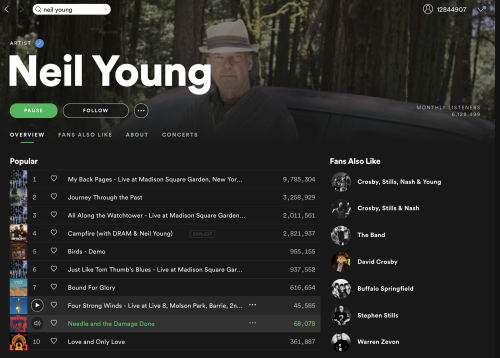I quit buying CDs more than a decade ago. It was a tough decision, especially since my relationship with recorded music started around 1970. I have gone through the vinyl LP, cassette, and CD phases quite nicely, if you were to ask a record company exec. I was a regular customer.
But when it became obvious early this century – post-Napster, I might add – that things were different. We were either going to be buying our songs a la carte or by the album on iTunes, or listening to them on a streaming service. I could read the writing on the wall. I did buy a fair number of songs and albums in digital format, which I transferred to my iPod and iPhone. But somewhere in there I also started streaming my music. At first it was on a service whose name I no longer remember, and later on Rhapsody.
Enter, Spotify
I had heard of Spotify as well, but the Swedish start-up was not yet available in the US. That is, until 2011, and I quickly signed up and didn’t look back. In no time I evolved from the standard “free” version with ads, to the premium model. It was a no-brainer, because suddenly I had access to what now totals 70 million tracks.
Today, with 356 million total listeners, of whom 172 million are premium subscribers, Spotify sits atop the heap of music streamers. But it just found itself in the news, and slightly backed into a corner, with an ultimatum issued by 76-year-old rocker Neil Young: Get rid of the Joe Rogan Experience podcast, or I’ll take my music and go home.
It was an easy decision for Spotify. They pulled everything, save for some collaborative performances that can still be found on the site. Oh, the damage done.

So What’s The Problem, Neil?
The debate was over Rogan’s propensity to play infectious disease expert, and in Young’s mind, Rogan was spreading false information regarding COVID and vaccines. Since Spotify had inked an exclusive $100 million deal with Rogan, the outcome was predictable. He generates ad revenues in the millions. His 11 million subscribers are worth far more than people downloading old Neil Young tunes.
For those too young to know or remember, Young was once part of the seminal rock back Crosby, Stills, Nash, & Young (CSNY). Like all the members of the band, he had solo recordings, and achieved a pretty high degree of success in the 70s. He then started to slide into obscurity, except for those who liked his protest songs and deeply introspective lyrics.
Now lest you think that Young, or anyone else for that matter, gets rich from songs streamed on Spotify, think again. Spotify pays between $0.003 and $0.005 per stream. The money has been squeezed out of the orange that is recorded music. You either have to have many millions of fans streaming your songs, or go on a huge worldwide tour and sell lots of merch.
As for Young, I’m sure he isn’t hurting for money. It was just last year that he joined the growing number of artists who have sold part or all of the publishing rights to their songs. In Young’s case, he sold 50-percent of his rights for a pricey $150 million. He didn’t need Spotify.
And as it turned out, Spotify sure as hell didn’t need him. Oh, if you must listen to some Young songs today if only to become familiar with his catalog, you can still find him over on Apple Music. Or by clicking the links I scattered herein.
The Principle Of The Matter
All of which means that this is a matter of principle for Young. I get that. But Young over-estimated his pop culture capital, and he was called on it. To be completely honest, in my 11+ years on Spotify I never once went looking for any of his music.
Until this. Oh well. I think I’ll survive, so will he, and most definitely will Joe Rogan. Because he just pushed the needle on Rogan’s popularity, causing people to search for him as well.
The only difference is that they can still find Rogan on Spotify. Old man, look at your life. It’s a whole new world out there. In the digital era, you can lose relevance just as fast as you can gain it. Kind of like how all those physical recordings lost their relevance.
Young may have been a miner for a heart of gold, but all that gold he has was just tarnished a bit.
Dr. “Old Hippies Don’t Die, They Just Fade Away” Gerlich


